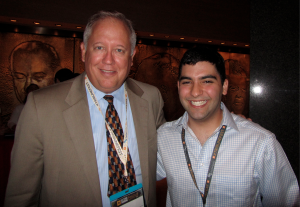Brazil, U.S. Should Work Together Towards 21st Century Goals
Brazil, an emerging global economic power, has a lot to teach the world about leadership, according to U.S. Ambassador to Brazil Thomas A. Shannon. He engaged the audience Saturday evening inside the dark amphitheater at the Lyndon Baines Johnson Library at The University of Texas, about what exactly Brazil, and even Latin America’s, significance is towards our nation’s future. Statistics like “Latin America has been growing at 6% a year” and “by 2015 economists expect Latin America to grow by 1/3” grabbed students, professors, parents, and other business professionals towards the edge of their seats as some unknown truth about Latin America’s potential was revealed to the audience.
“Twenty years ago Brazil was defined by its inequality. It had military rule for two decades,” Shannon said. “However, as Brazil engages with its problems, it sends a very clear message to the world that it is much more capable to do bigger things than it did 20 years ago. Shannon further discussed how he believes Brazil has some of the strongest democratic institutions in South America because of the free, fair, and transparent election processes that has been enforced, which ensure that there is no break during a political transition period.
Brazil’s draw dropping population growth that is now just under 200 million people further added to Shannon’s reasons for why economic opportunities are available in Brazil for the United States. Even with 80% of the population living in urban areas, segregation has been essentially eliminated here and isn’t an issue as it is in the United States, he said.
“Brazil holds the only region of no state-on-state conflict, no international terrorist movements, no secessionist movements, no religious strife, and has found a way to turn the diversity and segregation that existed in the past, into a foundation for unity and nationhood.” Furthermore Shannon states, “It has effectively eliminated the basis for large-scale crisis for the nation.”
Apart from just the strength of Brazil’s economy that is beginning to become a popular model across the world, Shannon touched on the nation’s attractive culture and ability to solve deep social problems as two other critical components that we should look with its model of leadership. Ambassador Shannon states how he sees “Democracy as a revolutionary form of government” in world politics and how it’s capable of peacefully transforming your country as shown here in Brazil.
“A huge amount of social innovation has even been found in Latin America in the level of local government, neighborhoods, and religious groups, whose policies have become enacted.” The public’s response to Barrack Obama’s appearance in Brazil was seen as something “more than just friendly,” Shannon said. “It was almost ecstatic.”
Shannon believes the people of both nations can learn something from one another because of the agenda, policies and values that both countries share, especially when it comes to building infrastructure and education. “Even as we think about our hemisphere and the role of Texas in the future, we must remember that these values are part of the world that is building a 21st century agenda in areas of education, science, engineering, solving social problems, that are immediately relevant to University of Texas, and anything all of us do. There is an opportunity here for enrichment, engagement, and opportunity.”
The bigger question from his visit lies in what we can do to help countries that are in current struggle, such as those involved in the Arab Spring, to “find a voice for themselves or move from a closed economy to own economy where they can connect regionally.” Shannon questioned how we can build our confidence to engage in that world with enthusiasm instead of hostility, as it has been done here in Argentina, Brazil, Chile, Peru, and even right now in Mexico.


